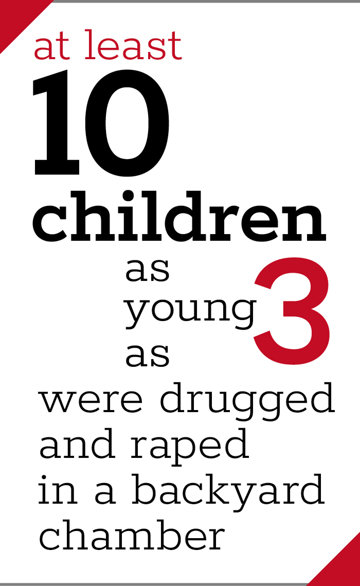Inside, police found a dirty mattress on a frame, folding chairs and a fan.
Other items were in the room—the kind used to restrain and drug children.
“I just don’t want the world to think that this is our community.”
Assistant District Attorney Brian Jones, describing the scene inside the underground chamber, said the children were drugged, “and tied to the bed, into the chair, into a pole. And then people would come and pay money to have sex with these children.”
By late July, seven individuals involved had been arrested on charges including human trafficking, kidnapping, rape, sodomy, sexual torture and sexual abuse of a child younger than 12.
As confessions continue, more arrests are expected. At least 10 children—some as young as three—were victimized, according to law enforcement, and more will likely come forward. Among them were three of one suspect’s own children, and a fourth, his partner’s daughter.

A photo of the room has been released to help trigger the memory of any victims. “There are some allegations with individuals that we will have a hard time identifying, just because we don’t know their names. And the children were drugged, according to one of the co-defendants. And so they may not be able to recognize or be able to identify anyone,” Jones said.
Bibb County Sheriff Jody Wade said the trafficking ring had been in operation for at least three years. He said it was the worst case of child abuse he has seen in his career and that the acts uncovered were so cruel that they led him to question humanity.
The news has devastated the small community, whose website describes Brent as “a strong Christian community full of caring, hardworking people.”
“Like everybody, my emotions are all over the place,” said Bobby Terry, a local minister who has been attending the prayer vigils. “I just don’t want the world to think that this is our community. I’ve been living here my entire life and there’s never been anything of this magnitude. I mean, we have problems, you know, but there’s never been anything like this.”
“We can’t assume that just because we’re in small towns that everything operates like it did in the days of The Andy Griffith Show,” district attorney Robert Turner Jr. said. “A lot of these small towns may appear to be Mayberry, but they are far from it.”
And beneath it all, the whispered question, put into words by a local resident: “How did no one know? All that time, and no one saw any sign?”
That question grew louder when Sheriff Wade revealed that the children, rather than being kidnapped or missing, had continued attending school and other community functions.
Didn’t anyone notice anything different about these children? Anyone at all?
“No one thought anything like this could happen here.”
One former teacher said she had. During the 2023–2024 school year, she was concerned about one of her students who showed signs of neglect: poor hygiene, frequent absences and noticeable delays in physical, cognitive, social and language skills. She voiced her concerns to school administrators—again and again. Those who could have dug deeper chose to do nothing. The teacher turned out to be right—the child in question was one of the victims.
Meanwhile, the God-fearing people of Brent continued doing the one thing they knew they could do. They did it once before, in May 1973, when one of the most violent tornadoes in Alabama’s history destroyed 90 percent of the town, leaving most without shelter. At that time, they came together, helped one another and prayed.
They gathered on the Bibb County Courthouse lawn, where the defendants will appear before a judge over the next weeks. A community in shock, coming together.
The mayor of Brent’s sister town, Centreville, attended the vigil. “When this happens, you’re literally shocked like a punch in the face,” he said. “In the South, we are all about being front porch people, knowing our neighbors, talking to them. We need to be that way again.”
Lynn Ellinghaus, who was born and raised in Brent and who attended a vigil, worried that the emerging allegations of child sex, torture and trafficking could wreak spiritual havoc on the community.
“People are just absolutely shattered over this,” she said. “No one thought anything like this could happen here.”
Tragically, no state and no nation is immune to the contagion that is human trafficking. And Brent, in many ways, was more vulnerable than most.
According to child advocate Carolyn Potter, who is based in Alabama, rural communities where law enforcement is spread thin and where poverty is rampant are particularly ripe for the flesh trade. Children get trafficked by relatives or by those with family connections. It pays the bills.
And Brent—where nearly half the town subsists below the poverty line, where many roads are dark and untended, where too many homes are overrun by tall grass and weeds, and are few and far between—makes an ideal breeding ground for the disease of human trafficking.
Sheriff Wade has warned the town that more revelations are forthcoming and that, to date, law enforcement is only “scratching the surface.”
More arrests and more victims are likely to emerge.
“I know God’s forgiveness is boundless, but if there was a limit to it, I think we reached it,” he said.






















